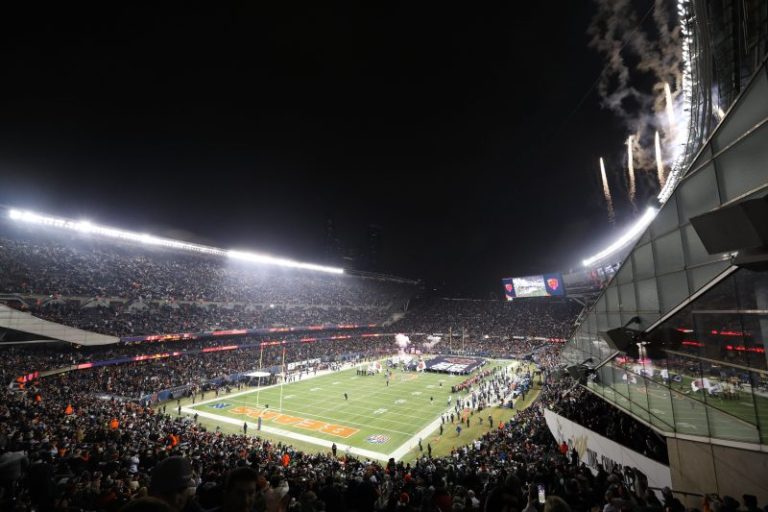LAKE FOREST, ILLINOIS — The days of the Chicago Bears playing home games in the city of Chicago are numbered if all goes according to plan this fall.
Bears chairman George McCaskey and team president Kevin Warren reiterated Friday in a news conference following a joint practice with the Miami Dolphins that the franchise remains intent on building a new domed stadium (and an accompanying mixed-use development) in suburban Arlington Heights, Illinois, on a 326-acre site that was previously the Arlington International Racecourse.
Warren said Friday team officials are meeting weekly with Arlington Heights leaders, and initial designs for the project are already done. He was optimistic the project will begin later this year and formally break ground in early 2026. The comments came less than a week after Chicago Mayor Brandon Johnson said again the team “belongs in the city of Chicago” during a local radio interview with 670 The Score.
“We are still extremely focused on Arlington Heights, on building our stadium there. That’s the plan,” Warren said in his opening remarks. “We strongly believe that is the only location in Cook County (Illinois) that will allow us to build a stadium, the new Chicago Bears stadium, with a fixed roof.”
It has been a winding journey to reach this point for the Bears, who have played at Soldier Field on the Chicago lakefront since 1971. The team purchased land in Arlington Heights in 2021 for $197 million with the hope of building a new stadium complex that would also include hotels, housing and entertainment options. But the Bears began negotiating with other potential sites in 2023 after it couldn’t agree to a deal on property taxes with Arlington Heights.
The Bears and city officials then released plans in April 2024 for a new fixed-roof stadium to be built in Chicago next to the current Soldier Field. But Illinois Governor JB Pritzker called the proposal’s use of more than $1 billion in state bonds and taxpayer money to finance the project a “non-starter.” A year later, the Bears announced they had shifted their focus back to Arlington Heights.
“There’s multiple levels of things that have to occur to get a deal done,” Warren said when asked about not being able to work out a deal with the city of Chicago. “You have to have a willing heart, and I would say Mayor Johnson and the people of Chicago were willing. But then you have to be able to put the deal construct together and make sure it works from a financial standpoint.”
The Bears are seeking a state-of-the-art stadium with a fixed roof in hopes of hosting of major events like the Super Bowl, Final Four and College Football Playoff in the future.
Warren emphasized the team still needs the Illinois General Assembly to pass a bill this fall that would freeze property tax assessments for designated “mega projects,” and allow tax bills to be set by local leaders. The Bears’ new stadium and mixed-use facility would fall under these parameters. The bill did not come to a vote this past spring.
Warren said Friday the project would create more than 56,000 construction jobs and 9,000 permanent jobs.
“These things take time,” McCaskey added. “It’s on us to convince the governor and the state legislators that this is a good idea for the people of Illinois and we need to do a better job at that. This project can be … transformative and the concern is that delay means greater expense and it also means we’re missing out on another round of assignment of major events. We need to get in the mix.”

